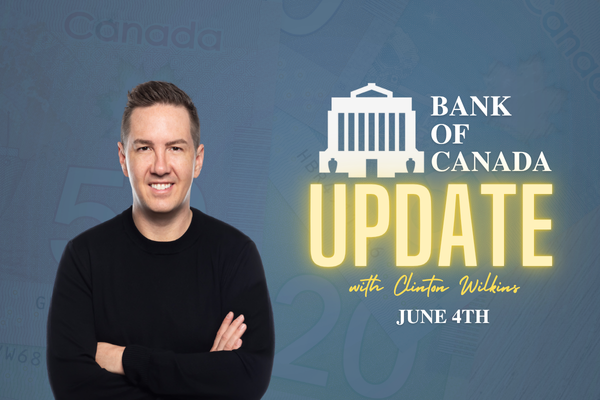Clinton Wilkins joins Todd Veinotte on 95.7 News Radio to discuss The Bank of Canada holding its key policy rate at 2.75%, marking the first pause after seven consecutive cuts.
CTV Morning Live: Financial Literacy Month
Clinton sits down with Kelly from CTV Morning Live to talk about financial literacy month.
Don’t feel like watching? Check out the video transcript below.
Transcript:
Financial Literacy Month
Kelly: [00:00:00] Well November is Financial Literacy Month, although this subject many of us are raised to consider impolite to talk about. Well, we’re getting over that this morning with mortgage broker Clinton Wilkins. Good morning Clinton.
Clinton: [00:00:09] Good morning. Thanks for having me.
Kelly: [00:00:10] November Financial Literacy Month and this is a basic need. And yet many people are hesitant to talk about it, but that comes at a huge cost to ourselves.
Clinton: [00:00:18] Well I think it’s a little bit of a taboo subject. You know people don’t want to talk about their debt or how much they make or how much they owe on their mortgage.
Kelly: [00:00:24] Right. And actually speaking of mortgages that is the biggest purchase and the biggest debt we will carry with us.
Reviewing your mortgage
Clinton: [00:00:29] 100 percent and I think November and Financial Literacy Month is a good time to look at your household finances and the mortgage is the biggest piece of that pie.
Kelly: [00:00:36] Right. Ok so let’s let’s delve into that. Where do you want people to start thinking about, you know when it comes to saving money on the mortgage?
Clinton: [00:00:44] I think you know the biggest thing that people need to look at, I think they need to review their mortgage at least once a year. The typical term in Canada is five years. So, typical terms are either a five year fixed or a five year variable and I think that people need to look at look at their term at least once a year. Just make sure that they’re still in the best product, and it’s the best fit for them and their household finances.
Variable or fixed
Kelly: [00:01:04] So variable or fixed; what do you recommend or does it totally depend?
Clinton: [00:01:07] I think it depends on the person. In Canada, about 40 percent of borrowers are in a variable rate. Historically people do better in a variable, but there’s been a lot of noise in the media. I’m sure some people have seen on CTV, the prime rate went up two weeks ago. And that certainly impacted a lot of borrowers because their mortgages now become more expensive. So either their payment went up or their amortization got longer.
But, I think that people in a variable rate really need to weather the storm because I think they’re going to see a few increases now over the next 18 to 24 months. But, the rates are going to come back down because I think likely there’s going to be a recession and inflation is going to come back down. I mean I’m not an economist but that’s what the economists are saying.
You know a fixed rate does provide more security but it comes at a cost. So fixed rates are typically more expensive than a variable will be, and borrowers will pay more in a fixed rate over the same amount of time, historically. And I think that fixed rates are a little bit more risky in some ways.
Renewal
You know when a fixed rate comes up for renewal people can have a little bit of payment shock. So if we think about the rates that were three, four or five years ago, people were getting a fixed rate of around two and a half percent. And now the renewals are coming at four percent, four and a half percent. So those people going from two and a half to four and a half are really seeing a big shock in their payment when they’re in effect.
Kelly: [00:02:19] It does look a personality thing though too because people, some people really like knowing what they’re going to pay what they’re going to get.
Clinton: [00:02:24] And there’s a value there because I think if you’re going to lose sleep over what’s going to happen with the rate and what’s going up with the payment then pay a higher rate and have that security of knowing what your payments going to be every month.
What about new buyers?
Kelly: [00:02:33] Right ok. With that prime going up have you noticed that’s keeping some people out of the market? Or is there a hesitancy with new buyers?
Clinton: [00:02:39] You know what, I think it’s almost the opposite. I think when the rates go up, I think some people get off the fence and say you know what I was thinking about doing something, maybe now is a good time to do it. And you know going into the fall I think it’s a great time to look at buying real estate. Typically sellers become a little bit more motivated because they don’t want to hold their real estate over the winter; they don’t want to clear the snow, heat the property. So I think going into the fall is a great time to look at homeownership and who doesn’t want to be in a new home for the holidays.
Kelly: [00:03:08] Right. And you do feel that pressure too if it’s not selling right away; that people will start to think, oh there’s something wrong with that house or you know the longer it’s on the market there that your stress levels do go up.
How is the market in Atlantic Canada?
Clinton: [00:03:16] For sure. And I think that the market in Atlantic Canada certainly has been heating up. I think that there’s a challenge around the inventory. Right now there’s more buyers in a lot of these markets than there is inventory. So I think the prices will go up. I think going into the end of 2018 and into 2019 it’s a good time to look at homeownership. It’s part of the Canadian dream.
Kelly: [00:03:37] Yeah.
Clinton: [00:03:38] And I think seeking the advice of an unbiased mortgage professional is great. And I think specifically in November it’s a good time going into holidays to look at your household finances and looking at your mortgage debt.
Kelly: [00:03:50] And then we can take a big deep breath by January when it’s all cleared out and we have our Christmas shopping and we need to restart.
Clinton: [00:03:55] Yeah exactly. I think that at that point you know once you receive your bills from the holidays. If you haven’t done something in November and December, January is a great time to look at that finance again and maybe a refinance may work; work out well for you maybe need to access some of that equity in your home to get that unsecured debt under control.
Kelly: [00:04:13] Well, thank you for chatting with us about money. We’re getting much more comfortable dealing with.
Clinton: [00:04:16] I know let’s just talk about it.
Kelly: [00:04:17] It’s just part of life.
Clinton: [00:04:18] I know it’s just part of life.
Kelly: [00:04:19] Thank you so much Clinton.
Clinton: [00:04:20] Thanks for having me.
Have any more questions about financial literacy month, feel free to contact us!


